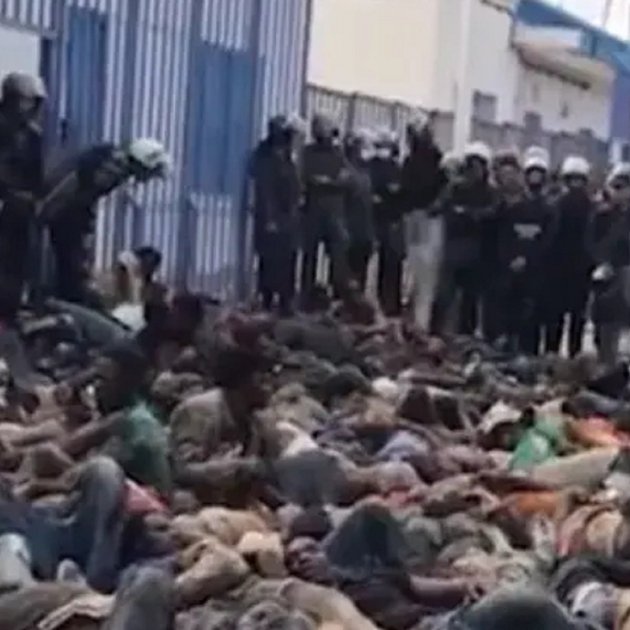The death toll of African migrants at the Moroccan-Spanish border now stands at eighteen after hundreds took part in an attempted mass border crossing on Friday morning on the outskirts of the autonomous city of Melilla. According to media reports, many died of crushing or suffocation when a human avalanche occurred and they were trapped near the border perimeter. In addition, there are 133 wounded among the African citizens and 189 injuries among the Moroccan police, who were attempting to stop the border breach. The tragedy came when hundreds of African migrants, including many of Sudanese origin, tried to cross from Morocco into Melilla, one of two Spanish enclaves in North Africa, at around 8:30am on Friday. Only 500 people managed to reach the high border fences out of the more than 1,500 who had taken part in the initial move towards the perimeter at dawn. Those who were then able to cross into Melilla's Barrio Chino district suffered a rain of gas canisters fired by the Spanish Civil Guard. At present, 133 people are known to have survived the Moroccan and Spanish police onslaught and entered Spain, many of whom came through breaks in the fences cut with shears. Emergency services say they have attended 57 migrants with serious injuries and 49 Spanish police officers with minor lesions.
Human rights group Iridia quotes @NadorAmdh as reporting that "Moroccan authorities have arrested many people who tried to jump the fence or had been immediately returned." It is "a serious violation of human rights", says Iridia, asking "is this the Moroccan assistance which Spanish PM Sánchez is grateful for?"
The alert was raised in the early hours of Friday, after Thursday's festive evening in the Spanish territory, the Verbena de San Juan. Spanish authorities had been warned of an attempt at a mass entry from Morocco. According to government sources, some 1,500 Moroccan security officers were brought in from around the country to patrol the border with Melilla. From the early hours of the morning, there were incidents and clashes between police and migrants pursuing the hope a better life in Europe. Police fired tear gas canisters and used batons on the hundreds of people who were trying to reach the fence by any possible route. Moroccan police have affirmed that the collaboration with Spain is total and that they will accept all those that the Spanish authorities want to return.
Iridia reports that at least 5 people are known to have died in the border crossing attempt and denounces the "dangerous joint action" by Spain's Civil Guard and the Moroccan forces.
Attempts to storm the border fences of the Spanish territories of Melilla and Ceuta are nothing new, and the last major mass crossing in Melilla took place in March, while in May 2021, the Moroccan government deliberately stood down its border controls in Ceuta for several days to provoke a wave of migration as a way of pressuring the Spanish government. That on-going dispute was part of the context for the controversial rapprochement between the governments of Madrid and Rabat that was announced in March this year. Over the current border breach, Spanish prime minister, Pedro Sánchez, has praised Morocco's collaboration in trying to stop the "violent and organized" assault on the fence and expressed solidarity with Melilla and the security forces, without mentioning the Africans killed in the incident at any time. Sánchez said this on Friday following the European Council meeting in Brussels, offering support to members of the Spanish security forces who were injured in this action.
Tweet from AMDH (Moroccan Human Rights Association) stating that "violently and armed with stones, sticks and knives" the migrants attacked the barrier fence. "A lot of injuries".
According to Moroccan authorities, many of the migrants arrested in the attempt to enter Melilla are of Sudanese nationality and came from nearby forests where they had been congregating in recent days in preparation for a mass entry into this Spanish city on the North African coast. In fact, Moroccan security services had carried out two interventions in recent days to abort these preparations, involving hundreds of Africans who were seeking to cross into European Union territory from the Moroccan district of Bini Buiafrur.
